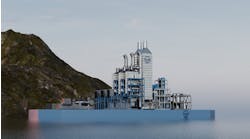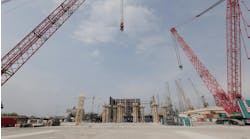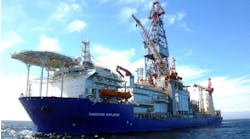Woodside not interested in deal, but others are
It appears that the Shell's proposed acquisition of Australian Woodside Petroleum is dead in the water. Following a Board of Directors meeting, which did not include Shell members, Woodside concluded that the proposal "falls well short of any proposal that could be accepted and recommended to shareholders."
Under the proposal, Shell offered to sell Woodside a portfolio of upstream assets in exchange for the issue of 429 million new Woodside shares, which represents a A$16 billion proposal. The deal included all of Shell's upstream assets in Australia, interests in the Maui, Kapuni, Maari, and Pohokura fields off New Zealand, and a 20% interest in the Soroosh and Nowrooz "buy-back" projects in Iran. Woodside's grounds for rejection were based on several reasons.
- The proposal will not, to any significant extent, add to the company's future earnings per share.
- The assets do not provide the strategic diversity from the company's existing assets that it has been seeking from new acquisitions.
- The portfolio of assets would not, to any significant extent, increase the proportion of oil to gas in the company's assets, which has been an important component of Woodside's strategy.
- The proposal is not near to the non-Shell appointed Directors' view of an adequate premium for control of Woodside; nor, in any event, is the premium accessible to shareholders.
The fact that deal was off was further enforced when Shell announced that it had sold a 10% stake in the Sunrise, Sunset, Greater Sunrise, and Evans Shoal gas fields in the Timor Sea to Osaka Gas of Japan. The interest in these fields made up a major part of Shell's upstream Australian assets, which it offered to Woodside. However, Woodside also made a similar sale. Woodside sold 10% stakes in permits NT/RL2, NT/P55, ZOCA 95-19, ZOCA 96-20 for $67.2 million while Shell sold 10% interests in permits NT/P47 and NT/P48 for an undisclosed amount.
It was thought that Shell may increase their offer for the company after the initial rejection, but following the sale of the assets, it has been determined to be off, at least for the time being.
Unocal boosting Thai investment
Unocal's Pailin Field is the target of a $270 million investment by the company.
Unocal is planning to invest about $350 million in two developments in the Gulf of Thailand and a possible additional $200-300 million on future exploration. The company said that it plans to spend $270 million to expand the Pailin oil field and $80 million on an unnamed gas field.
Unocal presently has three gas discoveries awaiting development - Pakarang, Gomin, and Arthit. It is expected that Pakarang will be the target development. Pakarang is located in Block 11, north of the Erawan Field, which has been in production since 1981.
The field was discovered in 1983, deemed commercial in 1998, and completed the full appraisal of the reservoir last year with four delineation wells. Unocal estimates the gross gas resource potential for Pakarang at 275-550 bcf. Furthermore, Unocal already holds a gas sales contract with the Petroleum Authority of Thailand (PTT) for the nearby Erawan, which Pakarang could possibly tie-in to.
The unnamed gas field is expected to begin production mid-2001 at an estimated 15,000 boe/d over seven years. As far as Pailin, located in Block B12/27, Unocal concluded negotiations with the PTT for the sale of Pailin gas under a 30-year agreement, which is expected to be signed soon by the government.
The company plans to develop Pailin using as many as 30 wellhead platforms and two central processing platforms. The gas will then be exported through PTT's subsea pipeline to Rayong.
Unocal further believes gas exists along the Thai borders with Vietnam and Cambodia. The company said it plans to invest a further $200-300 million in a future exploration program in those areas.
The company also formed a strategic alliance with Australian engineering contractor subsidiary Clough Thailand and Unithai Shipyard for offshore Thailand construction projects. The new alliance, called the "UCU Alliance", will integrate Unocal's wellhead platform construction group with the other two into a new organization that will design, procure, fabricate, and install wellhead platforms and subsea pipelines. The UCU Alliance will operate under a shared risk/reward framework. Clough said it estimates the value of the alliance and associated projects at A$250 million over the next seven years.
Pertamina wants ExxonMobil out
The new Indonesian government is still feeling the effects of two governments past as it goes through a bit of "house cleaning" to get the country back on track. Pertamina, the state oil company of Indonesia, said that it wants special incentives granted to oil companies during the Suharto Presidential reign, two presidents back, revoked.
Specifically, the company has asked the government to revoke the special incentives including a favorable tax regime granted to ExxonMobil for the 46 tcf (recoverable) Natuna gas field. ExxonMobil reportedly retains 40% of the profits from the Natuna output compared to 30% under the present production sharing agreements for gas fields.
Pertamina said the deal issued in 1995 during the Suharto reign is not standard practice and it wants a restructuring of the contract to return it to the present norm.
The Minister of Mines and Energy has since drafted a letter to current President Wahid asking for the deal to be revoked by presidential decree. In addition, when the contract expires in 2004, ExxonMobil will be asked to pull out of the field if there is no commercial recovery beyond that time.
ExxonMobil holds the lion's share of the field, with 76%, to Pertamina's 24%. As part of the initial contract the company planned investment of some $40 billion into the field. On another note, Pertamina has said the it plans to offer a number of exploration blocks up for licensing this year as well as 19 areas of production sharing agreements.
Fletcher enters Bayu-Undan
New Zealand exploration and production company Fletcher Challenge Energy has joined Phillips in the Bayu-Undan Liquids Project in the Timor Sea. The company recently signed an agreement with Australian-based Petroz through which Fletcher will be given an option to acquire shares, take a further placement, and underwrite a 3:5 rights issue to acquire a minimum 33.7% shareholding in Petroz for an estimated cost of approximately NZ$80 million.
The deal is a plus for both parties. On the Fletcher side, the company gets in on not only the 400 million bbl of condensate and LPG and 3.4 tcf of natural gas reserves of Bayu-Undan, but also the Australian oil and gas industry. On the Petroz side, the company plans to use the deal to secure and fund its 8.25% portion of the capital investment in the Bayu-Undan project and also provide capital for exploration.




